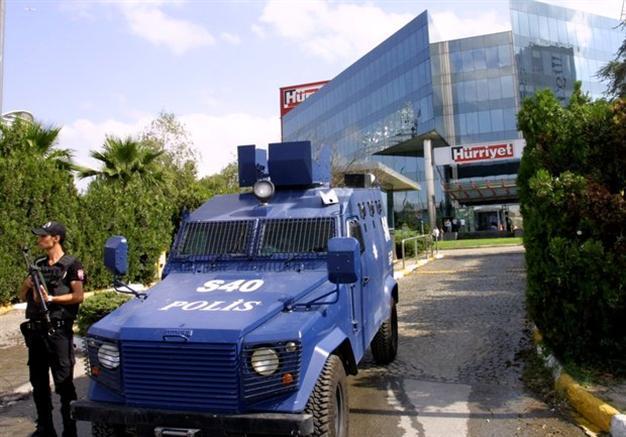Our live-in cops at Hürriyet HQ
Belgin Akaltan - belgin.akaltan@hdn.com.tr

CİHAN photo
I told you (I know, many times) I was in Kosovo serving in an international mission some time ago. There was a large Turkish police contingent serving there also, made up of very nice, intelligent, English-speaking ones; some of them were international experts lecturing at the Police Academy. I mean, they were very qualified. We were good friends. At one point, I was going to share a flat with a policewoman. When I was back in Turkey, I visited my former office, a major TV station. My friends were asking about living conditions there. I told them, in the cafeteria, that I was about to share a flat with a police friend. They stopped talking. The tables around us stopped talking. The reaction was, “WHAT? Are you going to live with a police officer?” I had a hard time explaining that we were good friends, brothers and sisters serving in a foreign country.My police friend, while on leave in Turkey, had the same reaction when she said she was to share a flat with a journalist. She also got the “WHAT?” from her police colleagues. This is a very symbolic anecdote showing the “warm relations” between the police and journalists in Turkey.
Nevertheless, here at our Hürriyet headquarters in Istanbul, we have been living together with policemen; the riot squads who have been here protecting us since the mob attacks.
The “warm relations” I mentioned above continue in our spacious yard, café, corridors, cafeteria, male restrooms, etc. (I don’t know what’s going on in the male restrooms, I’m just guessing).
I decided to take the relationship one step further and befriend some of them. Since they are not allowed to talk to the press, with our intern Ege Şenol Çalışkan from Aydın Doğan Vocational High School accompanying me, we introduced ourselves, had chats with them, took down notes, everything unofficially and nonpolitically.
‘Taste the gas’
We spoke to separate groups and I think the highest point in our chats was the moment when they told us that during their riot squad training, tear gas was sprayed directly into their eyes by their trainers with the comment: “Taste this first and then you will use it accordingly.” (Wow) This is very good in theory, of course.
Most of our live-in policemen are new cops. They are from all over Turkey, from Kelkit (he sends special regards to our big boss, Aydın Doğan, who is also from Kelkit), Adana, Diyarbakır, Istanbul’s Beyoğlu, Mardin, Ankara, Kocaeli. One group we talked to was between the ages of 20 and 22, the other group was 22 to 26.
While we were comparing our notes after one chat, Ege cracked a joke when he went on the details of one cop: “He is from Of, 22 years old, trained in Samsun, four months in Istanbul. Hey, I know the GBT of the police now.” (Police stop mostly young people in Turkey and check their GBT, their general criminal records.)
Some of them are university graduates; there are teachers among them. Their daily life starts at around 6:00 in the morning; they go to work in civilian clothes. They change at the station. They leave their masks, shields and vests in their vehicle when they are strolling in our yard. Other equipment that they leave in their vehicle includes batons, heavy weapons and several forms of gas. The newest ones stay in the vehicle to guard the equipment and the vehicle. We will come to the gas a bit later…
During the day while they are protecting us, they are all involved with their mobile phones. They told us some of their colleagues have learned to speak English during these long waiting times. Almost all of them have enrolled in distance learning university programs.
Their working hours are pathetic (my words, not theirs). When there are terror incidents, they have no days off. They are all young, tall, fit, good-looking, proud to be policemen, actually very sympathetic, but I might be the only one in the entire building thinking that way.
They like being at the Hürriyet building. Some are here for a third time. At other protective duties sometimes they are on the street not able to go anywhere.
Those who can use gas are trained specially. They truly believe using gas is the last option and nobody fires directly at people (that’s what they believe). Some of them showed their injuries they got during training from fireworks fired at them. “I had not seen a firework before,” one said.
Their first real intervention was at a demonstration at Zeytinburnu. Not much happened but there was a water cannon and gas. They hate gas because if they do not put their masks on properly it leaks inside and affects them. They did not say so but they definitely loved that action and they want some more of a thrill, I sensed (don’t judge me).
They are aware that some people love them because they are cops and some people hate them because they are cops (is it possible not to notice that?). They say they have warmer relations in Anatolian towns, in the east and in their hometowns. The city of Istanbul is difficult for them.
They know people are different when they get to know them. Guys, I think it works both ways, believe me.
belgin.akaltan@hdn.com.tr
http://belgin.akaltan.com
https://twitter.com/belginakaltan/











